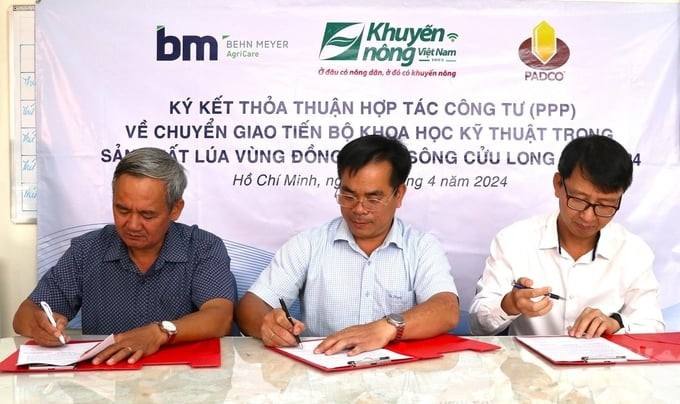November 25, 2025 | 14:22 GMT +7
November 25, 2025 | 14:22 GMT +7
Hotline: 0913.378.918
November 25, 2025 | 14:22 GMT +7
Hotline: 0913.378.918
On April 12, in Ho Chi Minh City, the National Agricultural Extension Center signed a public-private partnership (PPP) agreement with Behn Meyer Agricare Vietnam Co., Ltd. and Phuong Nam Agricultural Development Co., Ltd. (PADCO) on transferring scientific and technical advances in rice production in the Mekong Delta region.

The public-private partnership (PPP) aims to accelerate the process of building Project "Sustainable development of one million hectares specializing in high-quality and low-emission rice cultivation associated with green growth in the Mekong Delta region." Photo: Tran Phi.
Vietnam currently exports rice to more than 150 countries and territories, accounting for more than 15% of the world's total rice exports. Rice plays an important role in the structure of the entire agricultural sector in general and the Mekong Delta in particular, but the rice industry still has limitations, such as low-quality rice and low competitiveness.
The Public-Private Partnership Program aims to promote the application of technical advances in farming, which is a practical solution to overcome difficulties, aiming for green and sustainable agricultural growth. The program also aims to implement the "Project of one million hectares of high-quality and low-emission rice" initiated by the Government and being implemented by the Ministry of Agriculture and Rural Development.
Mr. Doan Van Chien, Head of the Permanent Office in the South (National Agricultural Extension Center), said that in the condition of limited budgets and investment resources, mobilizing economic components through the public-private partnership program is essential to enhancing the modernization of agricultural and food systems towards green growth. Since then, the National Agricultural Extension Center has coordinated with other forces to continuously update the latest technological processes, solutions, and technical advances to help farmers have technical packages suitable for each ecological region, aiming for a sustainable and responsible rice production chain in the future.
"In today's science and technology, businesses are the leading force, transferring results and effectively applying them to production practices. I assume that the role of businesses in public-private partnerships will be a push to further accelerate technical applications," Mr. Doan Van Chien emphasized.
The public-private partnership working group on rice was newly established in mid-2022 and has so far shown positive results, contributing to accelerating the process of building Project "Sustainable development of one million hectares specializing in high-quality and low-emission rice cultivation associated with green growth in the Mekong Delta region by 2030."
Translated by Thu Huyen

(VAN) With its diverse ecosystem, Phu Quoc National Park plays a vital role in environmental protection and biodiversity conservation and serves as the core zone of the Kien Giang World Biosphere Reserve.

(VAN) Cooperation activities under the Aus4Skills program focus on: logistics professional development, competency-based training and assessment (CBTA), leadership innovation, and digitalization.

(VAN) Minister Tran Duc Thang has affirmed that the models developed by Que Lam Group serve as a practical foundation for the Ministry of Agriculture and Environment to direct wide-scale replication.

(VAN) Viettel is applying automation technology that helps Vietnamese agro-products clear customs more quickly, cut costs, and maintain quality.

(VAN) Vinh Long, Viet Nam’s ‘coconut capital,’ is facing a major opportunity to advance sustainable agriculture by reducing carbon emissions from cultivation.

(VAN) Ho Chi Minh City still has many areas for improving forest quality, saving energy, reducing emissions, and generating carbon credits.

(VAN) ILDEX Vietnam 2026 will connect more than 250 exhibitors and 10,000 visitors from 40 countries.